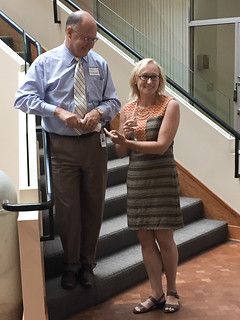
Secretary of Transportation Lynn
Peterson.
(Photos © J. Maus/BikePortland)
TriMet’s new Orange Line (a.k.a. the Portland-Milwaukie Light Rail Transit Project) doesn’t officially open until September 12th, but the agency has been busy for weeks now offering preview rides for various organizations and interested parties.
Speaking of parties, last night I attended an event hosted by the Portland chapter of the Women’s Transportation Seminar (a group that promotes professional advancement for women in the transportation industry). We met in the lobby of CH2M Hill, the massive consulting and engineering firm conveniently located just steps from the MAX line on Southwest Lincoln and 4th Avenue.
I snacked on light appetizers and chatted with a few folks before TriMet General Manager Neil McFarlane grabbed the crowd’s attention and shared a few words. He mostly thanked a bunch of people (many of whom were in the room) who helped deliver the $1.5 billion project. He also touted a long list of stats that spoke to the project’s economic impact. “This project happened just when Oregon needed it most,” McFarlane said, “We created 14,000 jobs at a time when the state was economically depressed.”
At the end of his speech, one of McFarlane’s old colleagues on the project, Lynn Peterson addressed the crowd. Peterson is currently the Secretary of Transportation for the State of Washington. But when the politics of the Orange Line were hot and heavy, she was a Clackamas County Commissioner who weathered a brutal storm from her anti light-rail constituency. Peterson offered a toast to McFarlane to honor his leadership and dedication to the project. It was a touching moment.
After the speeches and hob-nobbing, it was finally time to hop on board and ride the Orange.
From Lincoln and 4th we headed down into South Waterfront and up onto the new Tilikum Bridge. As we glided over SW Harbor Drive on the new viaduct, I wish we’d built a bikeway on this same structure. It would have been such an easy and direct connection for bicycle riders to the Tilikum instead of the disjointed bikeway route we ended up with. (On that note, part of me is frustrated we didn’t build a parallel protected bikeway alongside the entire line, but I digress).
Heading further into southeast, it was cool to see the new paths and bikeways that have been built. I also saw the fantastic new bike-themed mural at SE Division and 9th. I will go back soon for a closer look.
Advertisement
Further south on the route I spotted two new path connections I hadn’t seen before. TriMet has built a new paved path that connects the Johnson Creek Blvd park-and-ride station to the Springwater Corridor. (That station also has a big new bike parking cage that isn’t quite done yet.)
And south of Milwaukie, there’s a relatively large new section of paved path that gives people a much better connection to the Trolley Trail.
In total, TriMet spent $65 million of this project’s budget to improve access for biking and walking. For perspective, that’s more than the City of Portland spent on its entire, 300-mile bikeway network through 2008.
For that reason alone, the Orange Line is a Big Deal. McFarlane has reason to be smiling.
— Read all our past coverage of the Portland Milwaukie light rail project.



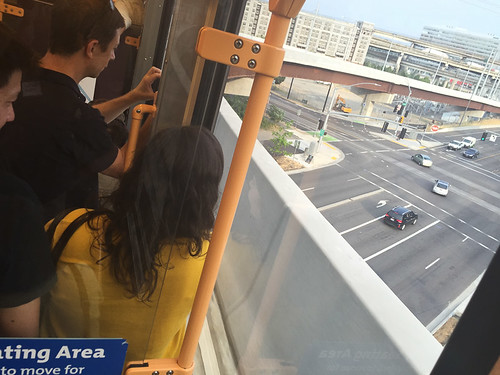
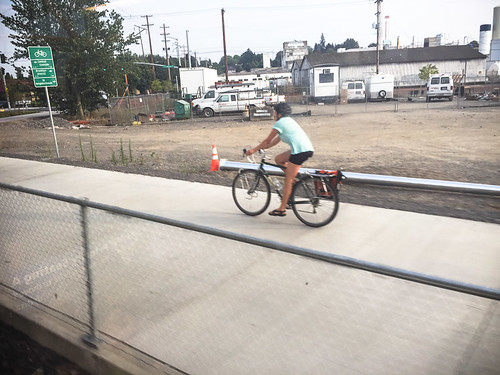
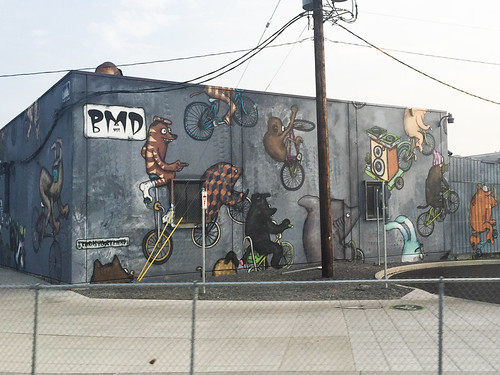
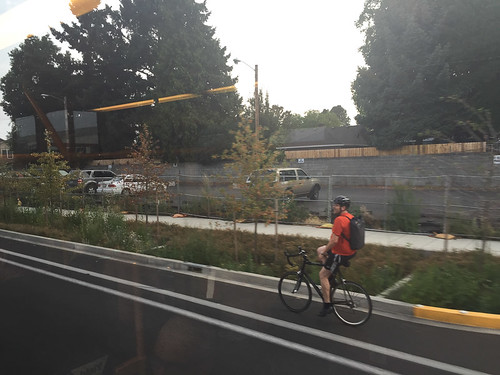
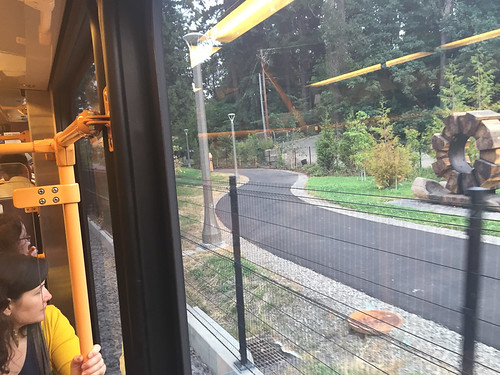
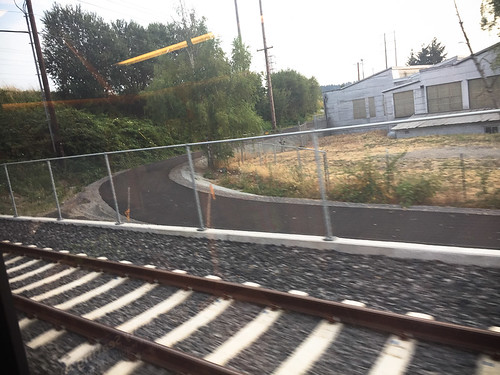
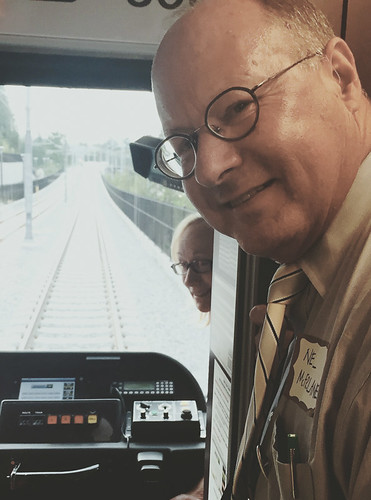
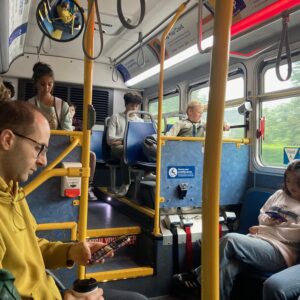
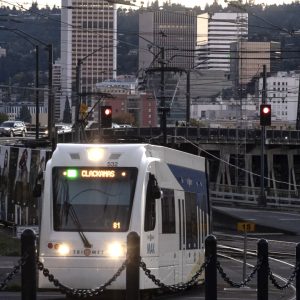
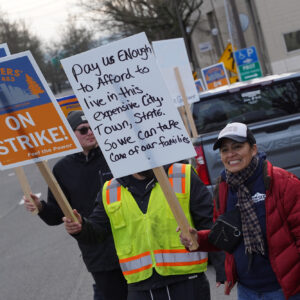
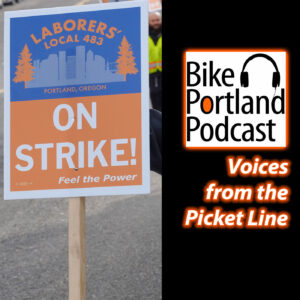
Thanks for reading.
BikePortland has served this community with independent community journalism since 2005. We rely on subscriptions from readers like you to survive. Your financial support is vital in keeping this valuable resource alive and well.
Please subscribe today to strengthen and expand our work.
I wish the buffered bike lanes on 17th would have been protected.
Additionally, while I appreciate the new MUP between Tilikum and SE Clinton, the crossing and signage leave a bit to be desired. The traffic signals are inconsistent – sometimes you’re expected to follow the bike light and sometime the walk light. Also, while the bike light is green, people driving are not banned from turning right across the crosswalk. So I could have the light and still get right-hooked. This poses a massive safety hazard and needs to be fixed immediately by keeping the car light red while the bike light is green. The pavement parkings could be better, too. Maybe more crossbikes?
Overall, a better experience than what was there before, however. Jonathan, didn’t you report a while back about SE Caruthers getting upgraded bike lanes? Is that still on track?
Overall, great reporting as usual. Can’t wait to ride over the new bridge already!
You have a good point. We spent over $1 billion on this. How much more would it have cost to build a 10ft asphalt MUP paralleling the entire line? It would also double as a maintenance access route.
Especially since it seems there will be funds remaining after the completion of this project…
So it seems everything is in order on the Orange Line. Time to stop paying people to guard the Tilikum Bridge barriers and take them down instead.
I could have used this on the 4th instead of spending 20 minutes of waiting and sidewalk chaos for a fireworks barge bridge lift.
I believe they are taking the time between now and September to train bus drivers and MAX/Streetcar operators.
I still don’t understand how much good its going to do when the bikes are separated for the most part. I highly doubt even a rookie bus driver is going to end up on the sidewalk.
As for the non separated parts… better to get used to them with bikes than not.
Probably some legal liability thing.
Honestly, it is probably budgetary. They budgeted operating funds for this year assuming a fall opening.
yeah… but what does the budget have to do with removing the barriers to the bike facility on Tillikum Crossing? I would be more likely to believe it is due to liabilities and insurance.
Jeff Owen, can you please speak to this?
Yes, Jonathan. What a lost opportunity for not including a path for pedestrians and cycling on the SW Harbor Viaduct from Lincoln to the CLSB.
I ride from the PSU campus area to the CLSB most every day. Sometimes back and forth multiple times. I have ridden on the viaduct (don’t ask me how) and the grade is perfect both up and down. Riding on SW Harrison St, et. al., is fast down, and a grind back up. Plus, there are many dangers between that could be completely avoided on the viaduct.
How did you ride on the viaduct?
I used gravity and kinetic energy on the way down and coasted nice and gently.
On the way up, it was a modest grade (unlike Harrison) and I pedaled up with a nice grin.
It was nice.
I expect that you won’t be the only one following the path of least resistance once the fences are down and the line is operating.
After all, it’s not like there’s any actual enforcement of the bus only lanes on SW 5th & 6th….
14,000 jobs?
You sure its not 140,000 jobs?
Nobody blinks an eye over the ridiculous price tag of $1.5 BILLION!
But the entire Portland Metro area goes bonkers over the fact that Trimet union employees were owed $900 million which they were then CHEATED out of so ridiculous project like this can be built!
GOD BLESS MURICA!
Did you mean to post this comment to Oregon Live?
Oh, Al is a well-known former bus driver with a huge anti-light rail bias. I think he got canned for leaking security footage of a MAX train crashing into a barrier a few years ago.
$1.5B, or half the price of one B-2 stealth bomber.
1/3 of the estimated price for the CRC. Fun fact: Trimet built the Tillicum crossing for less than the CRC group spent on planning over the past decade.
I’m guessing you are commenting over here as a person who loves to ride. Look forward to your future comments on how we keep making this a better place for pedestrians and folks on bikes. Ciao.
“”Did you mean to post this comment to Oregon Live?””
That comment directed at me?
No, that comment is for this post
A minor correction: the viaduct will carry buses as well as MAX light rail.
This is a fact.
Seems like a rip-off for $1.5 billion, somebody got mega rich in this swindle. The Shanghai Maglev is 19 miles long, goes 311 mph, and only cost $1.2 billion. Portland again got majorly ripped-off with this Orange line, IMO McFarlane should be fired, and put in jail for larceny.
I’m sure the Shanghai Maglev didn’t have to go through any equivalent of an Environmental Impact Statement, didn’t have to compensate land owners at the rate TriMet did, didn’t have to pay wages at American levels, and didn’t have to conform to the same construction safety standards. Comparisons to construction costs in other OECD countries might be useful, but comparisons to China are not.
Anyone know what happened to the ‘Velosaurus’ sculpture panels made from bicycle parts for the 17th Ave. underpass?
http://bikeportland.org/2012/10/16/trimet-to-unveil-velosaurus-art-that-will-adorn-new-path-across-se-powell-78907
They were completed back in 2012, and the wall mounts on the underpass have long been in place. Are they worried about vandalism, as happened with the smiley face spray painted on the Tilikum sonic dish?
Ok, color me stupid… Can we bike this new bridge, or not? I’m confused.
It’s my understanding that when it’s open the bridge is bikeable, but that nice and easy viaduct up to Portland State is not.
Thanks!
Hi Jonathan: In the “words matter” category, I submit the following:
“path that connects the Johnson Creek Blvd park-and-ride station to the Springwater Corridor. (That station also has a big new bike parking cage that isn’t quite done yet.)”
Please don’t use the term “cage” when talking about secure bike parking. You don’t have to use the Alta promoted word SPA (Secure Parking Area), but saying cage sends the wrong message. I’m open to changing my mind, but that is my current opinion.
Your thoughts?
Point taken Scott. I’ll consider that in the future. At this point, I think cage is a good descriptor of what TriMet builds. It is surrounded by a cage-looking fence and it feels and looks like a cage to me. But I hear your point. Thanks.
thanks Jonathan!
Love that you included the picture of the path that connects the Tacoma park-and-ride station to the Springwater Corridor. On the left side of that picture is a steep hillside of blackberries which was supposed to have a new stairway built as part of the project to make it easier for pedestrians to access the station. They cut it out of the project when, and never re-inserted it when they had left over money.